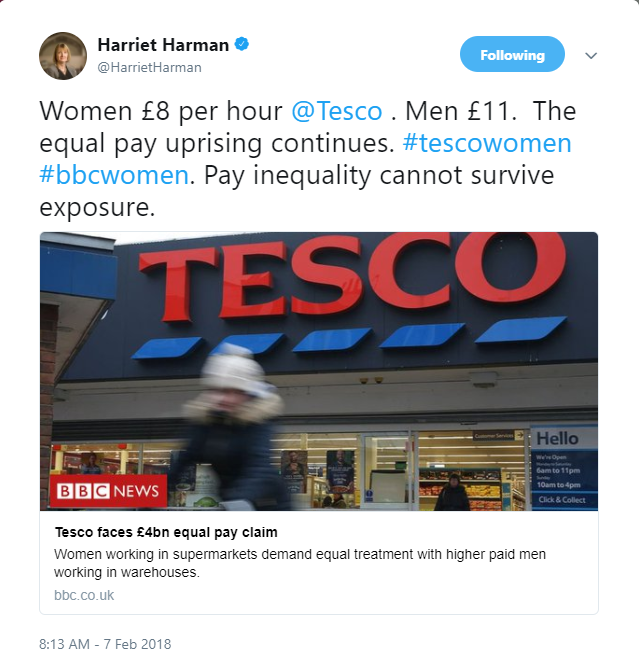Tesco is the latest supermarket chain to face allegations that it is paying women less than men for work of equal value.
The law firm pursuing the case says the retail giant could end up having to pay out around £4bn, which would make this Britain’s biggest ever equal pay case.
Leigh Day said: “In the week where we have marked the 100-year anniversary since women began to get the vote, the time has come for companies and public organisations to have a long, hard look at themselves, to see the inequality which is still deeply entrenched in their organisations.”
Some commentators seem to think the rights and wrongs of this case are straightforward:

Is it really that simple? Is it even about gender?
What’s the case against Tesco?
Leigh Day says Tesco employees who work in the company’s stores often earn less than those who work in distribution centres.
It says more than 1,000 current and former Tesco workers have approached them to take an equal pay claim forward.
The firm says the final bill could top £4bn, based on the idea that as many as 200,000 workers could claim compensation of several thousands of pounds a year for up to six years.
There isn’t a great deal more detail and Tesco hasn’t commented on specifics.
The company put out a statement saying: “We are unable to comment on a claim that we have not received.
“Tesco has always been a place for people to get on in their career, regardless of their gender, background or education, and we work hard to make sure all our colleagues are paid fairly and equally for the jobs they do.”
The Tesco case is similar to other large claims being brought against Asda and Sainsbury’s by Leigh Day.
“Equal pay for equal work”?
This isn’t a case where two people who are doing exactly the same job are being paid differently. That would be a clear-cut offence under equality legislation.
But very few of the high-profile pay equality cases we’ve seen in the last few years have been as simple as that.
The supermarket cases hinge on the concept of “equal value”.
Lawyers will argue that work done by someone on the shop floor is of “equal value” to that of a “comparator” – someone of the opposite sex doing a job perhaps traditionally seen as more physically demanding.
Proving this is quite technical, and involves a tribunal appointing independent job evaluation experts to assess the demands placed on different workers.
This is quite different from a famous equal pay case that is often mentioned in news reports alongside the supermarket cases: the ruling against Birmingham City Council in 2010 that led to the local authority paying out more than £1bn in settlements.
In that case, mostly-male manual workers were getting generous bonuses and other benefits denied to mostly-female workers on the same pay grade. It was a simpler case, in that the complainants had already had their jobs assessed and graded the same as the higher-paid workers. There was no dispute that they were doing work of equal value.
Daphne Romney QC, an eminent equal pay lawyer who worked on the Birmingham case, told FactCheck:
“At Tesco and Asda the question will be: is working in a warehouse a more demanding job than working in a store? It’s difficult, because they involve different skills – for the shop floor, first of all you are customer-facing – you’ve got the skills to deal with the customers – and then you’re dealing with money.
“Also, a lot of the women say they are unloading and stacking the shelves, and they are working in cold conditions.”
But the employer could claim that distribution workers are genuinely doing much more demanding work and so deserve higher pay.
“It’s not as clear-cut as it was in the local authority cases. It’s a judgement call for the Tribunal and the independent expert: is the work done in the warehouse of the same value, making the same demands – or different demands, but coming to the same total points?
“If the work is judged to be of equal value then the claimants are entitled to the same money per hours worked as their comparators, going back six years from the date of the claim.”
Cases like this can drag on for years, so it’s not unusual for claimants to get payouts equalling ten or more years of back pay by the time they get a final ruling.
Is this really about gender?
Harriet Harman’s tweet isn’t quite accurate, in that not all the lower-paid shop workers are women and not every distribution worker will be a man.
But practically speaking, both groups are likely to be heavily dominated by one gender.
And while equality claims can be made by either women or men, the claim against Tesco will concentrate on female shop workers, comparing them to men in distribution roles.
Lower-paid men who work alongside women on the shop floor stand to be benefit too, though, if the women win their claim.
The men would be entitled to an equivalent pay rise in what is known as a “piggyback claim”.



